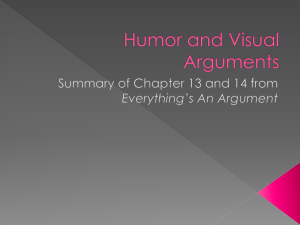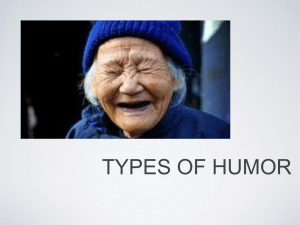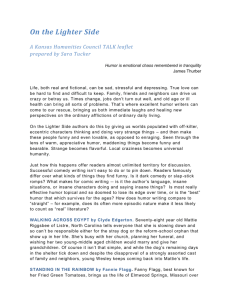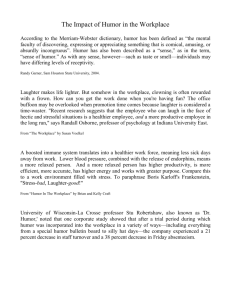humor_HarterRevisions
advertisement
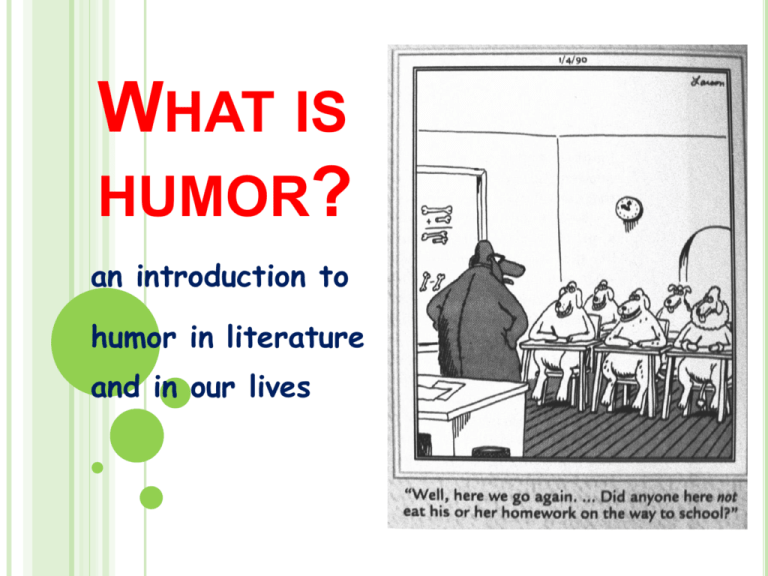
WHAT IS HUMOR? an introduction to humor in literature and in our lives WE HEAR THE WORD ‘HUMOR’ ALL THE TIME… But what does it mean? According to the Random House Dictionary, humor is defined as a comic, absurd, or incongruous quality causing amusement. WHAT DO WE THINK IS FUNNY? 5 RHETORICAL CATEGORIES… 1. HYPERBOLE = EXAGGERATION (OVERSTATEMENT OR UNDERSTATEMENT) FOR EFFECT EX. CARICATURE = AN EXAGGERATION OF A PERSON OR ARCHETYPE 2. INCONGRUITY/REVERSAL: “THINGS ARE NOT WHAT THEY SEEM.” INCONGRUITY/REVERSAL EVOKES HUMOROUS SURPRISE! The thing that would logically follow does not follow. You are led to think/believe one thing, but then it ends up being something else. Someone/something doing something that it normally does not do Ex. Self-deprecation, anthropomorphism, absurdity, anything hilariously unexpected. Reversal is in effect if two roles are reversed. If things just… don’t fit, then it’s plain ol’ incongruity. 3. SLAPSTICK: Humor that is physical in nature—”physically funny” Can involve (planned out)physical violence. Goes beyond rational common sense or logical thinking. Ex. People getting hit with/by things, a funny walk or fall, etc. SUCH AS… http://www.youtube.com/watch?v=3yc7sgN1zQM http://www.youtube.com/watch?v=Y9DNGgPNuFI &feature=results_video&playnext=1&list=PL0B13E 96303FE4097 4.SATIRE/PARODY Satire and parody both poke fun at people, government, celebrities, works of art/literature, etc. (think Stephen Colbert, The Onion, political cartoons, Shrek, etc.) Verbal irony is involved (saying something that is not to be taken literally) To “get” this humor, you need to know that it’s not really serious, but using a MOCKSERIOUS tone. IRONY USES MOCK-SERIOUS TONE SATIRE VS. More like mockery Humorous material has a serious goal of social/political awareness or change Often harshly critical underneath the humor (John Stewart and Stephen Colbert) PARODY More like mimicry Imitates the thing it is making fun of, but not in part Goal is just to make audience laugh by lightly mocking humorous aspects of the subject Sort of a tribute (Shrek) SATIRE: PARODY: http://www.youtube.com/watch?v=a0SVw5MJBU http://www.youtube.com/watch?v=vbgLapRAloQ &feature=relmfu 5. WORDPLAY Witty manipulation of words for humorous effect, often similar sounding words or double-meanings are used. Ex. Puns, innuendo, excessive alliteration or funny metaphors A coffin falls out of the vehicle carrying it. The undertaker says, “Oh, we should rehearse that.” GET IT? RE-HEARSE??!! Ahahahahaha…. WHAT IS NOT FUNNY… and why. “Consistency is the last refuge of the unimaginative.” --Oscar Wilde on homogeneous, repeated potty humor SOME KINDS OF “HUMOR” ARE INAPPROPRIATE IN POLITE, INTELLIGENT COMPANY Racist, sexist, religious, or homophobic jokes Teasing/Bullying for ANY reason Vulgarity for the sake of being vulgar Repeating the same thing over and over Clichés Remember: there is difference between being cruel and immature and actually being funny. It is never okay to laugh at someone else’s expense, whether it is a group of people or an individual.* *Unless the person being mocked knows it, and is expressly okay with it (like a“roast” of a celebrity). If even SLIGHTLY in doubt, don’t say it. IS HUMOR UNIVERSAL? Humor requires a relationship and an understanding between the speaker or writer and his audience. Without this understanding, humor cannot exist. Humor is worth nothing if the audience doesn’t “get” the joke. Inside jokes WHAT IS THE PURPOSE OF HUMOR? Effects on body, mind, and spirit ACTUAL HEALTH BENEFITS!! Humor can: relax an audience & make them feel welcome. important persuasion tool (humor is pathos!) makes troubles easier builds bonds between people increases immune system activity stimulates creativity decreases tension, anger, anxiety, and aggression WHY ARE WE STUDYING HUMOR IN ENGLISH CLASS? Humor is a reflection of our society Humor is informative Humor is persuasive Humor engages an audience Humor allows us to step back and not take ourselves too seriously WHAT ARE WE GONNA DO WITH IT? WE ARE GOING TO MAKE ZINES! Use humor in literature to bring us together Find common bonds we didn’t know we had Share and teach each other Improve interpersonal (and interclass) relations Have big time LOLZ! LET’S SEE HOW HUMOR-SMART YOU ARE! Where have you seen each of these elements of humor? a. WORDPLAY b. IRONY c. SATIRE d. SLAPSTICK e. PARODY f. HYPERBOLE g. REVERSAL h. INCONGRUITY
